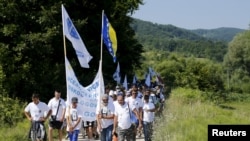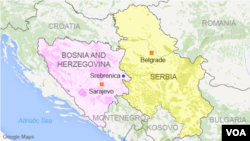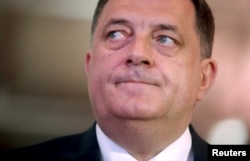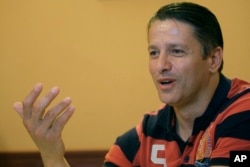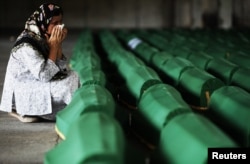Some bodies lay in plain sight on the floor of the forest when Dr Vedo Tuco, a forensic pathologist, entered Srebrenica at the end of the Bosnian war. Others he's still digging for – 20 years later.
"It was so quiet, there wasn't even the sound of the birds," Tuco, 48, said last month as a digger probed for bones in the yard of an empty house. "Once I started, I never stopped."
On Saturday, July 11, Bosnia marks the 20th anniversary of Europe's worst mass killing since World War II – the slaughter of some 8,000 Muslim men and boys by Bosnian Serb forces during five July days in 1995.
Tens of thousands of people are expected to attend the commemoration, when the remains of 136 victims recently identified will be interred beneath white marble headstones.
Even now, the forests and farmland around Srebrenica are yielding bones; over 1,000 victims are missing, tossed into pits then dug up months later and scattered in smaller graves by Bosnian Serb forces trying to conceal the crime.
Investigators believe at least one more big grave eludes them, while the accused architects – Bosnian Serb wartime leader Radovan Karadzic and military commander Ratko Mladic – are still standing trial at the United Nations war crimes tribunal in The Hague, fiercely unrepentant.
No closure
As such, Srebrenica remains an open wound, the lack of closure a dark shadow over Bosnia, where many Serbs still dispute what went on.
"I found and buried my husband, but have yet to reach my son," said Hajra Catic, whose son Nino was 26 years old when Dutch U.N. peacekeepers abandoned the "safe haven" of Srebrenica to Mladic on July 11, 1995.
"If I don't find him, if I don't have his grave ... they deny, they deny so many were killed, they can say tomorrow that I never even had him," Catic said.
For Muslim Bosniaks, Srebrenica has become a symbol of collective suffering. Serbs see it as a stick for the world to beat them with; many dispute the death toll and deny it was genocide, as the U.N. tribunal has ruled.
Milorad Dodik, president of Bosnia's autonomous Serb Republic, last month called the massacre "the greatest deception of the 20th century."
Dodik and Serbia have enlisted big-power ally Russia to block a British-drafted U.N. Security Council resolution condemning any denial of Srebrenica as genocide.
The Council vote was due Tuesday, but postponed to Wednesday under threat of a Russian veto.
Serb leader
Insisting the resolution would not pass, Serbian Prime Minister Aleksandar Vucic announced Tuesday that he would attend the anniversary commemoration.
"An entire generation has come of age with the denial of accountability often presented as the only 'truth,' and that is disconcerting," said Dijana Jelaca of St. John's University in New York.
Jelaca, whose research includes "critical ethnic studies" and trauma studies, said Srebrenica had become a tool by which political leaders on all sides whip up tensions, score political points and divert attention from the political and economic stagnation that has characterised the last decade in Bosnia.
It is indicative, too, of the divisions that still hold up progress towards the European mainstream.
This year, preparations were overshadowed by the arrest in Switzerland in June of Naser Oric, who commanded Muslim Bosniak troops in the Srebrenica region and who was acquitted in 2008 in The Hague of killing Serbs earlier in the war. He was arrested on a Serbian warrant.
Organizers threatened to postpone the burials if he were not extradited to Bosnia rather than Serbia, which he eventually was.
"I think families should be able to commemorate the loss of their loved ones without their mourning being used as a means of political blackmail," Jelaca wrote in an email to Reuters.
"I think that feeding into ethnic divisions serves ALL politicians in the region well, as they distract from the much more burning issue: Bosnia's precarious material reality – and by that I mean the dire socio-economic situation and increasing poverty."
Landmark trial
Tuco, who works for the Bosnia-based International Committee for Missing Persons (ICMP), is due to give testimony this year at a landmark trial in Serbia of seven Serbs, who in March were among the first alleged Srebrenica gunmen to be arrested in the country.
The trial should mark a moment of reckoning, yet there is likely to be scant coverage in Serbian media.
Meanwhile, the ICMP, which pioneered the use of DNA to identify many of Bosnia's 100,000 dead, is relocating to The Hague, becoming a fully fledged international organization operating around the globe.
Forensic anthropologist Dragana Vucetic, 34, admitted concern at what that might mean for its operations in Bosnia. More bodies means more work and more funding.
But, she said, "the big question is what will happen if no bodies are found."




